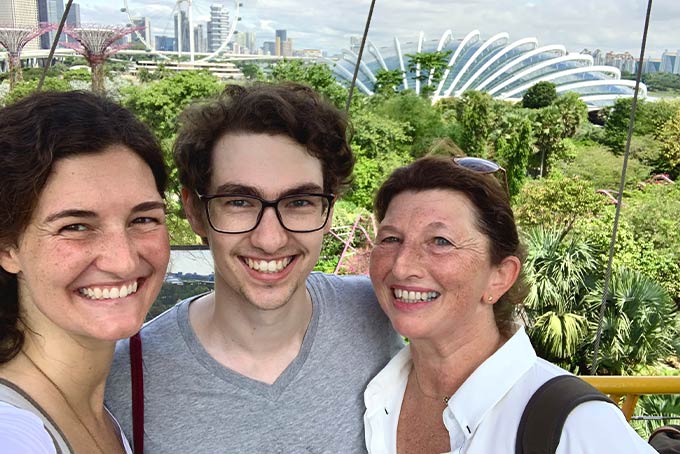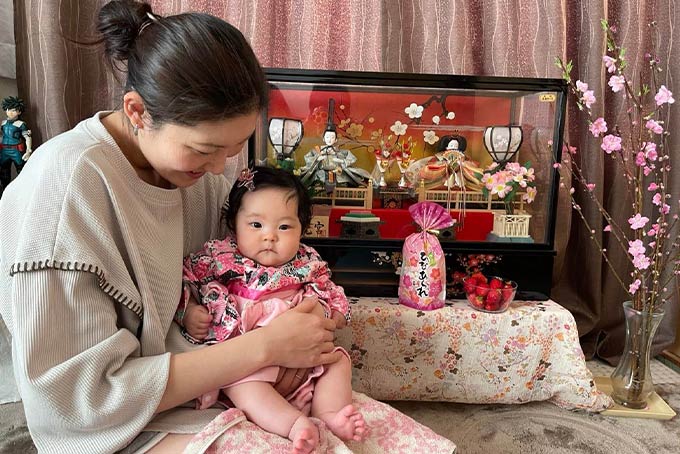May marks the World Maternal Mental Health Awareness Month with the 2022 theme being “Stronger Together. Supporting Women Worldwide On Our Journey Through Maternal Mental Health Care.”
The international campaign, with the support of global charities and organisations, aims to raise awareness around maternal mental health and change the narrative around the realities of motherhood. It primarily focuses on Perinatal Mental Health.
“During the pandemic, there is only additional stress, uncertainty, and isolation. Expecting and new parents tend to blame themselves if they’re not feeling happy, and those most critical of themselves are most vulnerable to depression and anxiety,” says Wendy Davis, executive director at Postpartum Support International and global awareness organiser.
Depression is the most prevalent mental illness in the perinatal period, with between 10 per cent and 14 per cent of mothers affected during pregnancy or after the birth of a baby.
However, maternal mental health is not only limited to perinatal mental health.
Kate Borsato, Canada-based maternal mental health therapist and founder of The Perinatal Mental Health Collective, explains: “Perinatal mental health refers to the period during pregnancy and up to a year postpartum. Many professionals in the field understand that mental health challenges don’t start or stop on a timeline like this.”
Adding: “In practice, the perinatal period could also include the challenges during a person’s fertility journey, and years into motherhood. Maternal mental health is a larger umbrella term that speaks to the general mental health challenges that all mothers might experience throughout motherhood, far beyond those first few years. You’ll probably notice that language is shifting away from “maternal” and more into “perinatal” or “parental” as this is more inclusive and less gender-binary.”
Living year three of the pandemic, it is safe to say that all mothers, not only first-time and expecting mums, are susceptible and exposed to maternal mental health issues.
According to a survey from the TUC, nine out of 10 working mothers reported that their mental health had been negatively affected by school closures. This is in addition to increased household responsibilities and work demands.
Women who have had miscarriage or failed IVF are also included. Experts say women who never have the opportunity to give birth to their conceived children are still mothers and The Miscarriage Association says it is what happens afterwards that contributes to mental health problems.
In contrast, older mothers face different challenges like the psychological impact of uncertainty of reuniting with children living abroad, just to name an example.
“Although we are most vulnerable to depression and anxiety around childbearing, maternal mental health is important for a lifetime,” says Davis.
The many faces of motherhood
To mark the World Maternal Mental Health Month, Vogue Singapore digs into the mental health of mothers. We spoke to four women from around the world about how they look after their maternal mental health.
Jaime Lee, Singapore
Working mum and mother of two children
“I’m generally a positive person, although having a newborn, contracting COVID and trying to protect the kids from the virus and still juggling work in the last month has been quite an exercise on my mental resilience. I have learnt to intentionally count all my blessings, so I don’t forget all the things there are to be thankful for, even amid very stressful times.
“My community has been amazing in this season—I’ve been so blessed with a supportive family, thoughtful friends and teammates who have been pillars for us. I believe having a strong community and a village you can count on for advice and emotional support when you need it is huge mental health support in itself.
“As the world tries to find its footing again, I hope my children will grow up in a place where they will not be afraid to be close to others, to be together rather than apart, not to fear exploration and new adventures.”
Kirsten Altman, Germany and Spain
Mother of two working adults abroad

“When COVID-19 broke and the pandemic spread like a wildfire across the globe, my son was living in Singapore, and my daughter was in Thailand. We had just seen each other at the turn of the year 2019/2020.
“For a brief moment there were concerns: Firstly, my daughter’s employer was uncertain of issuing her an extension visa in Thailand but later resolved when she flew back to Mallorca where I was at. Secondly, when I wasn’t able to attend my son and his long-time girlfriend’s civil wedding in Singapore during the first summer of the pandemic. My sadness vanished when I was finally able to personally hug them both later in 2021.
“My mental health is stable, everyday life is and was filled with work and a comfortable life in a quiet environment. Farewells are always very close to me—the tears flow and our heartfelt hugs, with which we express our love for each other, last a little longer. But then everyone goes their own way again, we’ll see each other again soon.”
Sarah Shockley, USA
Suffered two miscarriages and failed five rounds of IVF
“My husband and I have been trying to have a baby for almost six years now. We have faced testicular cancer, PCOS, two miscarriages, two IUI’s, five rounds of IVF, three failed embryo transfers and numerous tests and surgeries. Our inability to get pregnant is not for a lack of trying.
“My husband is the one person who can (almost) fully understand my struggle to become a mother because he is also trying to become a father at the same time. We are a team with the same goal in mind. I come from a family with ten children, so not being able to conceive was a complete surprise.
“I must admit I’m not prioritising my mental health as much as I should. Infertility and miscarriage are extremely heart-breaking, lonely, and depressing. I started seeing a therapist last year after our second miscarriage. Things that help me get in a better mental state are self-care, finding an online support group and writing my feelings in a digital diary.”
Arina Hirashima, Japan
Stay-at-home mother to two children

“My worries early on in my pregnancy were whether I would get vaccinated or not. Would it affect my unborn child, and what would happen if I contracted the virus without a vaccine? This was an ongoing debate I fought in my mind constantly.
My husband and I decided not to get vaccinated because we thought it might affect our child, despite the doctors recommending it. My biggest concern was how and what to do to protect my child. We know one of the most important infection prevention methods is to wear a mask, but a newborn can’t. I hope that one day we can just live with it and not worry too much.
This concern comes along making sure the needs of my three-year-old son are met. Thankfully, my husband has been supportive as well as the constant help from family who has helped me during this period.”
Expert-approved ways to look after maternal mental health
Borsato shares three ways on how to look after your mental health.
Identify and space for self
Mothers need an opportunity to feel like themselves, rather than being “mum” 24/7. When we enter motherhood, there’s this underlying pressure to give up everything to fully focus on our children, and by doing so, we’ll feel completely fulfilled. But this just isn’t the case for most moms. At any stage in parenthood, a major part of mental wellness is making space for your interests, hobbies, desires, and creative outlets.
Saying no, preserving inner peace
Learning the art of saying no. Overcommitting results in total burnout. We must look at our energy reserve as finite—it runs out at some point!
We are not an endless well of empathy, energy, enthusiasm, and resilience.
So when life feels particularly hard, as it has for many these past few years, we need to look at what we can take off our plates so that we preserve the energy we have for what truly counts.
Mindfulness and gratitude
A feeling that is common in all stages of motherhood is that “there’s not enough time for me”. Mums will hear the advice to do more self-care, but this advice is quickly dismissed because it seems impossible. And this is where the power of mindfulness and gratitude come into play. When we are truly paying attention to the moment, rather than worrying about the past or future, we could actually enjoy what’s in front of us.
For new and expecting mums Dr Kamini Rajaratnam, Singapore-based senior consultant psychiatrist at Better Life Psychological Medicine Clinic, shares four important pieces of advice:
Filter the information and advice you receive
New mums nowadays face a plethora of information and advice coming at them from social media, their support groups, friends, relatives and even care providers. This can be very daunting and leave a mum doubting her choices for her baby and eventually her ability as a mum. My advice to them, when confronted with any dilemma, is always to do what works for their mental health.
It’s okay not to get it right all the time
Some of the common dilemmas are whether to exclusively breastfeed, exclusively pump, sleep train or not and when to wean, how to wean and what to feed the baby.
There are so many schools of thought on parenting too, like attachment parenting, gentle parenting, and conscious parenting and they all offer veritable parenting advice.
It becomes a problem when mums struggle to apply these doctrines to their little ones without giving themselves any compassion in the process. A lot of new mums beat themselves up because they fall short of these ideals.
Look after yourself
I cannot overstate the importance of a mother’s mental health to a baby’s development. Babies depend a lot on mothers for their emotional and physical development and the early days form the bedrock of a child’s secure attachment. Having said that, as a perinatal psychiatrist, I see a lot of mums fight depression, anxiety, and a whole host of other mental conditions, without affecting their babies in any way. The difference is in getting help and treatment at any point in time. It is never too late to get treated and turn things around and no damage is irreversible.
Cling to a good support system
Having a good emotional support system also plays a large part in postpartum recovery. People who support you, love you unconditionally and can reassure you that you aren’t failing, motherhood is just that hard, are invaluable.
You are not alone. If you think that you are experiencing poor maternal mental health, contact NUH’s Women’s Emotional Health Service, which offers education on parenting, emotional assessment and support during and after pregnancy, support for gynaecological cancer patients, and fetal loss support, and individual and couple’s counselling.
Support is also available at KK Women’s and Children’s Hospital or from your doctor. Your GP can recommend you to a therapist or counsellor. International and local support groups are also listed here. Further resources for new parents can be found here.





